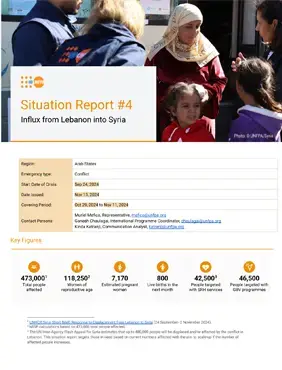The ongoing conflict in Lebanon has triggered a massive displacement crisis, with over 473,000 individuals crossing into Syria from Lebanon in just seven weeks. Among them, 25 per cent are women of reproductive age, many facing severe challenges in accessing essential health services, safe shelter, and legal support. The healthcare system in Syria, already weakened by over a decade of war, is under significant strain due to the influx of new arrivals. Reports from host communities and centres highlight a lack of privacy, inadequate access to basic services, and heightened protection risks for women and girls, particularly in overcrowded shelters and unsafe buildings.
In response, UNFPA is delivering life-saving sexual and reproductive health (SRH) and gender-based violence (GBV) services through 147 service points, including health facilities, women and girls’ safe spaces, and mobile teams. To date, over 19,600 individuals have received SRH and GBV services at border crossings, while in hosting centres and communities, UNFPA has distributed dignity kits, improved water and hygiene facilities, and expanded safe spaces. In Aleppo, UNFPA and partners have provided services to over 1,700 women and girls and trained 130 frontline workers to ensure quality GBV case management and reproductive healthcare. Across the country, efforts are ongoing to preposition supplies, recruit mental health and psychosocial support staff, and improve GBV referral pathways to meet the growing demand.
The Inter-Agency Flash Appeal for Syria, launched on October 7, 2024, seeks US$ 324 million to address the most pressing needs of 480,000 people, including those in host communities, over six months. Within this appeal, UNFPA requires US$ 7.5 million to sustain SRH and GBV programmes, of which US$ 1.15 million has been secured from key donors. However, a significant funding gap remains, threatening the continuation of critical services for vulnerable women and girls during this escalating crisis.


